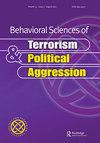用加拿大证据重新审视萨拉菲圣战恐怖主义中皈依激进化的解释
IF 1.3
Q2 POLITICAL SCIENCE
Behavioral Sciences of Terrorism and Political Aggression
Pub Date : 2021-05-18
DOI:10.1080/19434472.2021.1919911
引用次数: 2
摘要
摘要来自多个来源的证据表明,皈依伊斯兰教的人在萨拉菲圣战恐怖分子中的比例明显过高。一段时间以来,研究人员一直在猜测为什么会出现这种情况。本文确定并批判性地考察了文献中常见的四种假设性解释:(1)一些解释侧重于皈依者先前个人特征的意义;(2) 一些解释强调了从皈依到激进主义运动的快速性;(3) 一些解释强调激进的皈依者缺乏宗教知识;以及(4)一些解释指出了皈依者狂热的作用。检查每一种解释,我们发现假设的因果机制是不充分的,这些假设与我们收集的关于激进的加拿大皈依者的数据不一致。最后,我们提供了一个替代假设,基于对激进皈依者对失望经历的反应的分析,这种失望经历在皈依后时期很常见。本文章由计算机程序翻译,如有差异,请以英文原文为准。
Re-examining the explanations of convert radicalization in Salafi-Jihadist terrorism with evidence from Canada
ABSTRACT Evidence from multiple sources suggests converts to Islam are significantly overrepresented in the ranks of Salafi-jihadist terrorists. Researchers have been speculating for some time why this might be the case. This paper identifies, and critically examines, four hypothetical explanations commonly found in the literature: (1) some explanations focus on the significance of prior personal characteristics of the converts; (2) some explanations emphasize the rapidity of the movement from conversion to radicalization; (3) some explanations highlight the lack of religious knowledge on the part of radicalized converts; and (4) some explanations point to the role of the zealotry of converts. Examining each explanation, we find the causal mechanisms hypothesized are inadequate and the hypotheses are incongruent with the data we have collected on radicalized Canadian converts. In the end, we offer an alternative hypothesis, based on the analysis of the response of radicalized converts to an experience of disappointment that is common in the post-conversion period.
求助全文
通过发布文献求助,成功后即可免费获取论文全文。
去求助
来源期刊

Behavioral Sciences of Terrorism and Political Aggression
POLITICAL SCIENCE-
CiteScore
4.80
自引率
10.00%
发文量
27
 求助内容:
求助内容: 应助结果提醒方式:
应助结果提醒方式:


